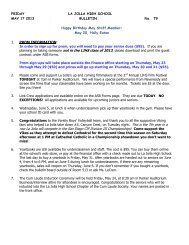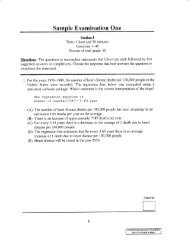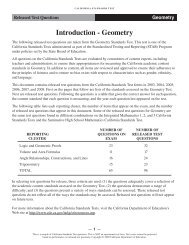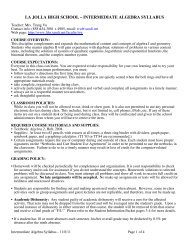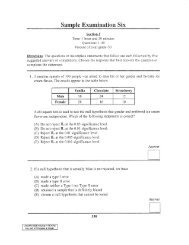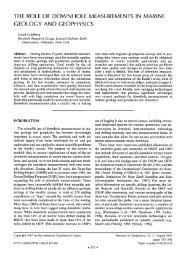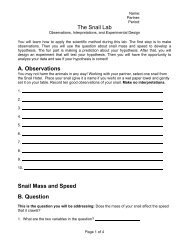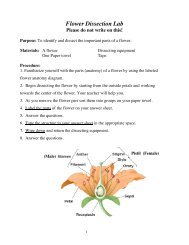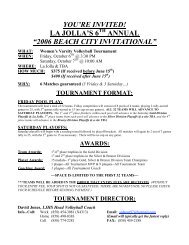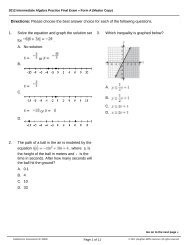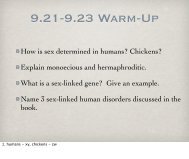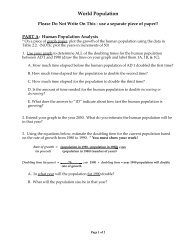ENGLISH LITERATURE 1, 2 Grade 12 - La Jolla High School
ENGLISH LITERATURE 1, 2 Grade 12 - La Jolla High School
ENGLISH LITERATURE 1, 2 Grade 12 - La Jolla High School
Create successful ePaper yourself
Turn your PDF publications into a flip-book with our unique Google optimized e-Paper software.
Common Syllabus for English Literature<br />
English Department • <strong>La</strong> <strong>Jolla</strong> <strong>High</strong> <strong>School</strong><br />
Official Course Description from the LJHS Academic Handbook<br />
<strong>ENGLISH</strong> <strong>LITERATURE</strong> 1, 2 <strong>Grade</strong> <strong>12</strong> [UC] [CSU]<br />
An advanced course which emphasizes the classical English writers and literary types of the last 1,000 years.<br />
Various types of writing are also emphasized.<br />
Prerequisite: A score of “Advanced” or “Proficient” on the English California Standards Test, and a grade<br />
of “A” or “B” in both semesters of the previous English class.<br />
Core Literature for <strong>12</strong> th Book Author<br />
<strong>Grade</strong> (English Literature)<br />
Common Core Lessons<br />
Beowulf<br />
[and<br />
Grendel]<br />
[Gardner] •<br />
•<br />
•<br />
•<br />
Epic Conventions<br />
Literary Terms: Kenning, Alliteration, Caesura<br />
History of the English <strong>La</strong>nguage<br />
Values of Society<br />
• Role of Poet/Artist/Bard<br />
• Oral Tradition<br />
• Point of View: Characterization<br />
• Parody<br />
• Philosophies of Western Civilization<br />
• Villains<br />
• Epiphany/Anagnorisis<br />
•<br />
•<br />
Absurdist Novel<br />
Style: Form and Function<br />
Hamlet Shakespeare • Tragedy<br />
• Structure<br />
• Historical Background: Elizabethan England, The Old Globe, Authorship of Shakespeare's Plays<br />
• Soliloquy<br />
• Rhythm/Rhyme/Meter/Iambic Pentameter<br />
• Poetic Devices<br />
• Literary Theory (and Controversy)<br />
Quarter Curriculum<br />
1 Beowulf [and Grendel]<br />
2 Hamlet<br />
3 and 4 Selected works<br />
Pacing Guide for English Literature<br />
. <strong>La</strong> <strong>Jolla</strong> <strong>High</strong> <strong>School</strong>'s <strong>School</strong>wide Student-Learner Outcomes (SSLOs)<br />
1. Students will demonstrate effective oral and written communication skills, and will be able to use technology when applicable.<br />
2. Students will develop the interpersonal skills necessary to work collaboratively, ethically, and effectively with others in order to be<br />
contributing members in a global society.<br />
3. Students will be able to demonstrate the higher order thinking skills of analysis, synthesis, application, and evaluation.<br />
4. Students will be able to demonstrate knowledge of the world's various viewpoints, belief systems, and cultures as well as American core<br />
values.
Scholarship and Citizenship Grading Policy for English Literature<br />
English Department • <strong>La</strong> <strong>Jolla</strong> <strong>High</strong> <strong>School</strong><br />
Scholarship <strong>Grade</strong>s<br />
<strong>Grade</strong>s are calculated using a point system. Assignments that are turned in late will not be eligible to receive the highest<br />
grade possible. All late and makeup work is due by a cutoff date announced by the teacher prior to the end of the quarter.<br />
<strong>La</strong>te work affects a student’s citizenship grade. Turning in work on time is expected/appreciated! Excessive absences<br />
which keep a student from participating in class may lower grades. Students must accumulate the following percentage of<br />
points possible in order to earn a scholarship grade of:<br />
A 90 - 100%<br />
B 80% - 89%<br />
C 70% - 79%<br />
D 60% - 69%<br />
F Below 60%<br />
Daily Work 30%<br />
Writing 50%<br />
Tests 20%<br />
Warning about Plagiarism In addition to the above, a student may receive a low scholarship grade based on refusal to follow the academic<br />
honesty policy. A first offense for plagiarizing or copying is a 0 on the assignment. Second-time offenders may earn an F in the class. Plagiarism<br />
includes copying someone else’s work, in part or whole, and passing it off as one’s own; or, using direct quotes or underlying ideas from other<br />
sources without citation. These are serious offenses—in college, a student can get expelled for plagiarism. Do not do it!<br />
Citizenship <strong>Grade</strong>s<br />
To graduate from high school, and to participate in many extracurricular activities including athletics, you are required to<br />
maintain a 2.0 grade point average in citizenship. The following descriptions should provide a guide in determining what<br />
you can expect in this course.<br />
4.0 E = Excellent 3.0 G = Good 2.0 S = Satisfactory 1.0 N = Not Satisfactory 0.0 U = Unacceptable<br />
To earn a citizenship grade of:<br />
E The student demonstrates the citizenship values above, consistently participates in class, and shows leadership qualities. The student has no<br />
warnings or reminders about behavior. The student consistently meets and often exceeds behavioral expectations. His/her absences are minimal<br />
and excused. The student follows classroom rules consistently and dependably. The student completes assignments on time. The student has<br />
fewer than three tardies.<br />
G The student demonstrates the citizenship values above, participates a few times, has at most one reminder about behavior. The student typically<br />
displays positive behavior and contributes to the learning environment. The student is consistently on task and engaged. The student follows<br />
classroom rules. The student generally submits work on time. The student may have one to three tardies.<br />
S The student may demonstrate citizenship values above, but his/her participation is inconsistent.. The student has turned in late work more than a<br />
few times. The student is inconsistent about following classroom rules. The student has been warned about a recurring unacceptable behavior<br />
and has not corrected or changed his/her behavior. The student may have more than three tardies. The student may have one or two unexcused<br />
absences.<br />
N The student does not demonstrate citizenship values above. The student frequently exhibits disruptive behavior and fails to follow classroom<br />
rules. The student is almost always late with assignments, or does not turn them in at all. Negative behavior patterns have not improved. The<br />
student has more than five tardies. The student may have three unexcused absences.<br />
U The student breaks classroom rules regularly (at least weekly, sometimes daily), and has received multiple warnings. The student makes little<br />
attempt to change his/her behavior. The student seldom completes work. The student has frequent tardies, three or more unexcused absences (or<br />
one verified truancy), or has exhibited behavior in class that led to severe disciplinary action.<br />
Campus Citizenship Values<br />
These things are valued on campus: We all need R.O.O.M. Respect Ownership Open communication & patience Manners<br />
Universal Tardy Policy<br />
• A first tardy will earn a warning.<br />
• A second tardy will earn a second warning and a contact with the home, usually a form letter or e-mail.<br />
• A third tardy will result in the citizenship grade being automatically lowered by one full mark from where it would otherwise have been.<br />
• A fourth tardy will result in a referral to the counseling office, a minimum of one day after-school detention, and a reduction of the<br />
citizenship grade by one additional mark.<br />
• A fifth tardy will lower the citizenship grade by one more mark, and a sixth tardy will automatically generate a citizenship grade of “U.”<br />
• A seventh tardy will result in a referral to a vice principal for “Defiance of <strong>School</strong> Rules,” and the student will be suspended for one day.<br />
Unexcused Absence Policy<br />
By the end of each quarter, teachers will check the absences records for students and count the number of unexcused absences (marked with an “A”).<br />
One to two unexcused absences may reflect a clerical error or failure by the parent to call in an excuse. But a third unexcused absence in a 9-week<br />
quarter shows a pattern of absences that will lower a student’s citizenship grade to an N. Four or more unexcused absences will earn the student a U.<br />
If an unexcused absence is verified as a truancy (marked with a “Z”) then the citizenship grade may drop immediately to a U.



